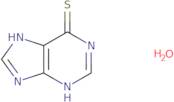Información del producto
- 1,4,5,7-Tetrahydro-6H-Purine-6-Thione Hydrate
- 1,7-Dihydro-6H-Purin-6-Thion,Monohydrat
- 1,7-Dihydro-6H-Purine-6-Thionemonohydrate
- 1,7-Dihydro-6H-Purine-6-Thionmonohydrate
- 3,7-Dihydro-6H-Purine-6-Thione Hydrate
- 6-Mercapto Purine
- 6-Mercaptopurine Hydrate
- 6-Merkaptopurin,Monohydrat
- 6-Purinethiol Monohydrate
- 6-Thiohypoxanthine Monohydrate
- Ver más sinónimos
- 6H-Purin-6-Thion,Monohydrat
- 6H-Purine-6-thione, 1,2,3,9-tetrahydro-, hydrate (1:1)
- 6H-Purine-6-thione, 1,7-dihydro-, monohydrate
- 7H-Purine-6-Thiolate
- 9H-Purine-6-thiol hydrate
- Leukerin Monohydrate
- Mercaleukin Monohydrate
- Mercaptopurine Monohydrate, 6-Mercaptopurine
- Mercaptopurine, Monohydrate
- Purin-6-Thiol,Monohydrat
- Purine-6-Thiol, Monohydrate
- Xaluprine
- 6-Mercaptopurine monohydrate
- 6H-Purine-6-thione, 1,9-dihydro-, hydrate (1:1)
6-Mercaptopurine monohydrate is a biocompatible polymer that is used as an antigen binding molecule. It is synthesized by coupling two amino-sugar monomers, 6-mercaptopurine and dinucleotide phosphate. 6-Mercaptopurine monohydrate has been shown to have synchronous fluorescence when attached to antimicrobial agents and inhibits the growth of infectious bacteria such as Salmonella, Shigella, Campylobacter jejuni, and Yersinia pestis. It also has inhibitory properties against mouse tumor cells in laboratory tests. Clinical studies have shown that 6-mercaptopurine can be used safely in pediatric patients with bowel disease. This drug also has surfactant properties.





